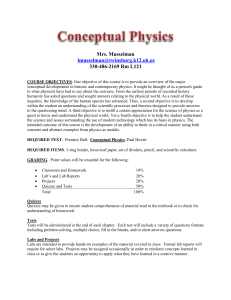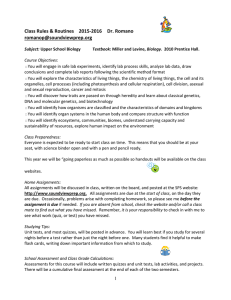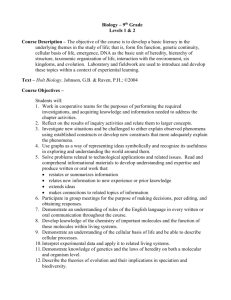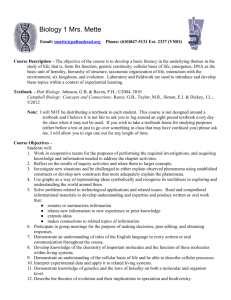Biology * 9th Grade - Palisades School District
advertisement
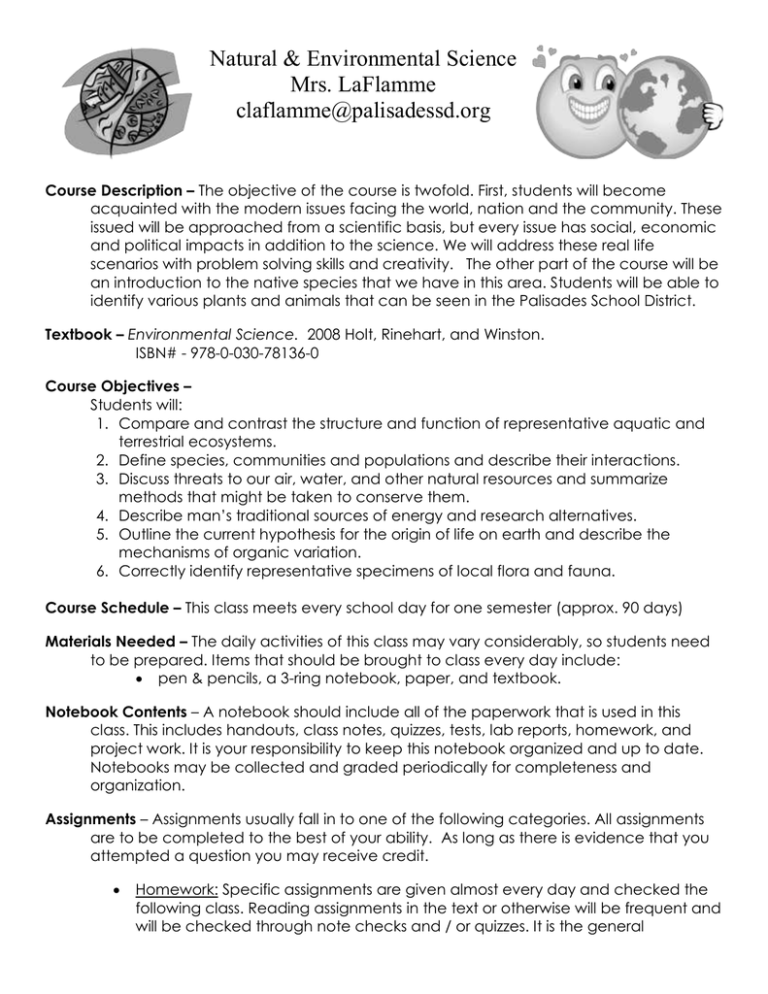
Natural & Environmental Science Mrs. LaFlamme claflamme@palisadessd.org Course Description – The objective of the course is twofold. First, students will become acquainted with the modern issues facing the world, nation and the community. These issued will be approached from a scientific basis, but every issue has social, economic and political impacts in addition to the science. We will address these real life scenarios with problem solving skills and creativity. The other part of the course will be an introduction to the native species that we have in this area. Students will be able to identify various plants and animals that can be seen in the Palisades School District. Textbook – Environmental Science. 2008 Holt, Rinehart, and Winston. ISBN# - 978-0-030-78136-0 Course Objectives – Students will: 1. Compare and contrast the structure and function of representative aquatic and terrestrial ecosystems. 2. Define species, communities and populations and describe their interactions. 3. Discuss threats to our air, water, and other natural resources and summarize methods that might be taken to conserve them. 4. Describe man’s traditional sources of energy and research alternatives. 5. Outline the current hypothesis for the origin of life on earth and describe the mechanisms of organic variation. 6. Correctly identify representative specimens of local flora and fauna. Course Schedule – This class meets every school day for one semester (approx. 90 days) Materials Needed – The daily activities of this class may vary considerably, so students need to be prepared. Items that should be brought to class every day include: pen & pencils, a 3-ring notebook, paper, and textbook. Notebook Contents – A notebook should include all of the paperwork that is used in this class. This includes handouts, class notes, quizzes, tests, lab reports, homework, and project work. It is your responsibility to keep this notebook organized and up to date. Notebooks may be collected and graded periodically for completeness and organization. Assignments – Assignments usually fall in to one of the following categories. All assignments are to be completed to the best of your ability. As long as there is evidence that you attempted a question you may receive credit. Homework: Specific assignments are given almost every day and checked the following class. Reading assignments in the text or otherwise will be frequent and will be checked through note checks and / or quizzes. It is the general expectation that even if no specific assignment is given, students will spend time reviewing notes and other material covered in class. Labs: Throughout the course, activities and labs will be conducted in order to strengthen understanding and develop inquiry skills. Labs may be directed with specific instructions or open-ended allowing students to develop their own procedures. Both formal and informal write-ups may be required at the conclusion of the lab. Quizzes: Quizzes will be used frequently to assess progress. These short assessments may be announced or unannounced. Often, quizzes will be used at the beginning of a class to check homework or at the end of a lesson to check understanding. Tests: Tests will always be announced a week in advance and usually occur at the end of a unit. Formats of tests vary depending on the material. See the quiz/test policy below for retake policies. Retaking tests are not meant to be a do-over, but as a way to improve your understanding of material. Grades may or may not be improved by retaking tests. Projects: Many units will include various larger projects that are designed to deepen understanding of the content, as well as developing applied skills. Plagiarism & Cheating – It is expected that students and instructors will act responsibly and honestly in all aspects of the course. • Plagiarism/Cheating is the stealing or claiming of someone else‘s ideas or words as your own without crediting the source and/or aiding in this act. This includes submitting the same homework, projects, etc… as another student or sharing your work with another student unless group work is specified in writing by the instructor. • Students are responsible for keeping their account information private and ensuring that all work submitted is their own. The following penalties will be assessed if a student is found guilty of defying the academic integrity policies: 1. You will be given a zero as a final grade on that assignment. 2. Parental notification by the teacher will occur. 3. First offense will result in a one day in school suspension. (ISS) 4. Second offense will constitute out of school suspension. (OSS) 5. You will be denied privilege of membership in academic clubs for the remainder of the year. Any future recommendations given by teachers may also be affected. Grading – Grades will correspond to the school’s grading system: Each marking period consists of 40% of the total grade with the final being worth 20%. Interim grade reports will be distributed periodically throughout the semester. Your grades can be checked online via the district website. Work will be expected to be handed in on time and complete. Late work will be deducted 10% per day. Points will also be deducted for incomplete work Attendance and Missed Work – Students are responsible for making up any missed work. All missed work should be completed and turned-in in a timely manner upon the students return. In some cases time will need to be scheduled after school to make up labs or other class work. If students know they will miss class in advance, they should ask the teacher for work before the absence. Each class has an absent folder located at the front of the room. I will not chase you down if you missed class and important information. Ask three before me! Contact Information & Extra Help– The best method of contacting me is via e-mail at claflamme@palisadessd.org. Other important information can be found at… If you need to stay afterschool for help or to work on a project please let me know in advance so I can make arrangements! Class Rules & Expectations – All school policies apply. We will develop our own class rules together and adjust them as needed. Generally speaking, everyone should respect each other, respect the physical environment, and respect the learning process. Cell Phone Policy – Cell phones can be a powerful educational tool, however, there are appropriate times and places for their use. Cell phones must be SILENCED and put away during class unless otherwise directed by the teacher. Cell phones may be used during labs as timers or recording devices, during class for quick checks or quizzes, or other educational means. If you are caught with your cell phone out without permission, it will be confiscated for the rest of the period. Portfolio Development – Students may wish to document their improvement in science by including certain activities in their portfolio. These activities include lab reports, diagrams and models, group projects and scientific writing. Safety Considerations – Science classrooms can be dangerous and it is vital that students listen to and follow all safety instructions. Students not paying attention to directions put themselves and their classmates at risk. This will not be tolerated; if you are putting yourself or a classmate in danger, you will be immediately removed from class and sent to the office. Computer Policy - There will be many times during the semester where we will be using the school’s computers. These times are to be used for doing work only. Game playing, instant messaging, emailing, and viewing inappropriate sites are not permitted. Failure to comply will result in the loss of computer privileges. Outline of Course Content – The content of the course will be tied to nine underlying themes of biology which will be infused into each unit. These themes include: Science as a way of thinking; Form fits function; Hierarchy of structure; Living things require energy; the cell is the unit of structure for life; Living things interact with their environment; DNA is the building block of heredity: Unity and diversity: and the core theme, Change through Time. The themes of the course are linked to the content outlined below: Ecological Principles and Their Application Interactions of Organisms and the Environment Types of Ecosystems and Communities Succession Population Principles Human Population Issues Organic Variation Traditional and Alternative Sources of Energy Human Impact on Resources and Ecosystems Pollution and Policy Natural History of the Palisades Area Please note: the amount of time spent on the course content may vary to fit the needs of a particular group of students.


